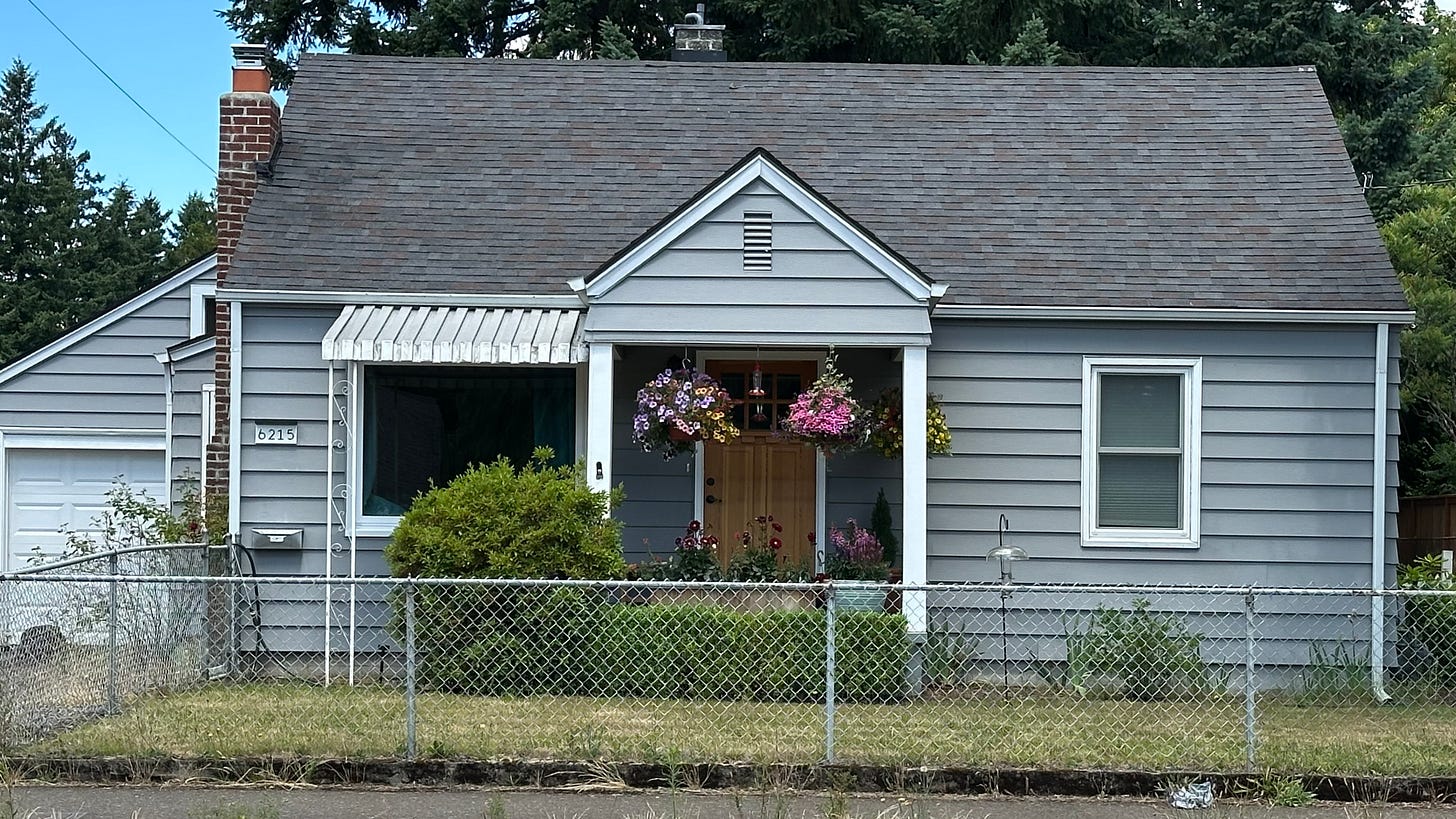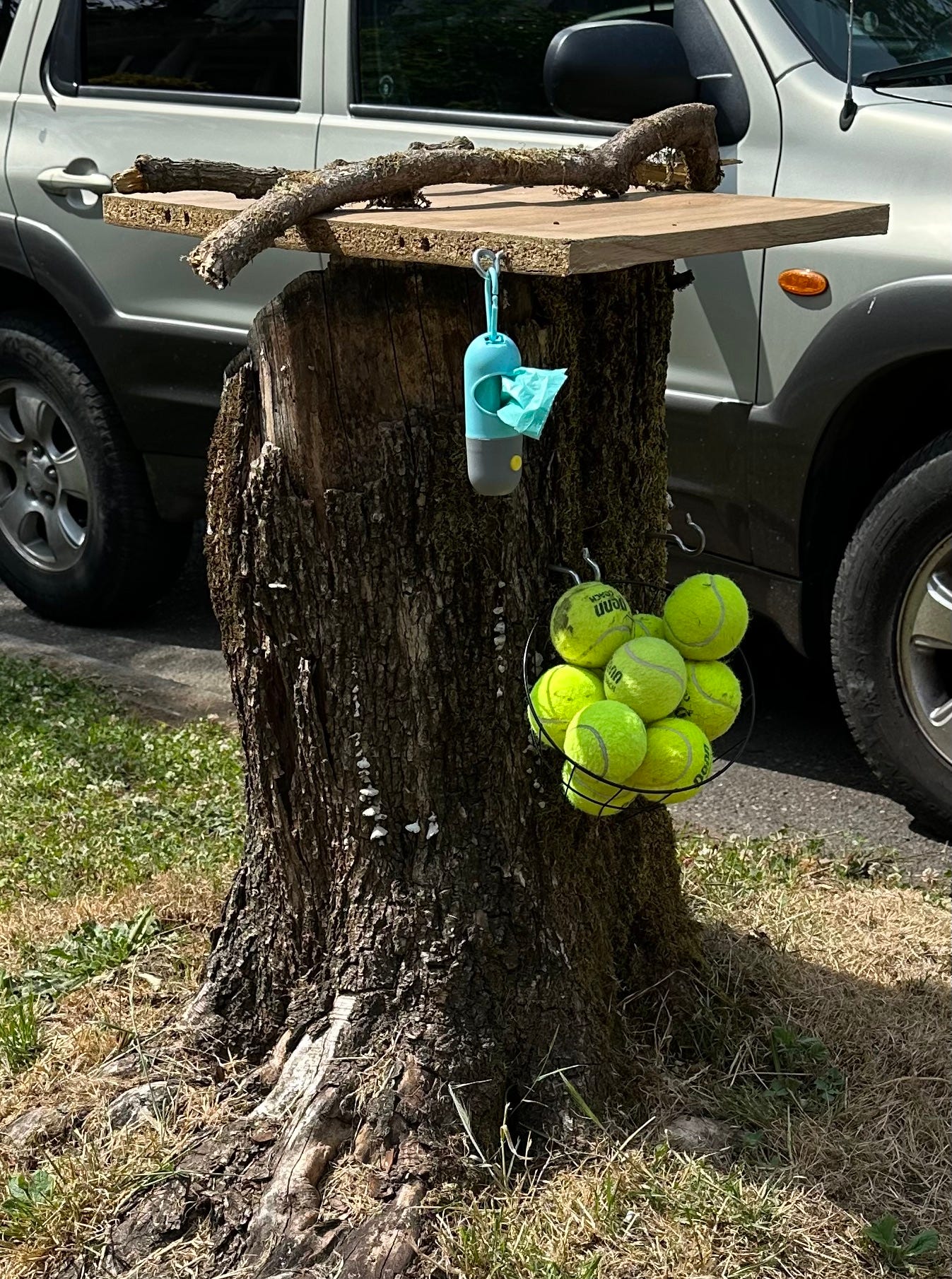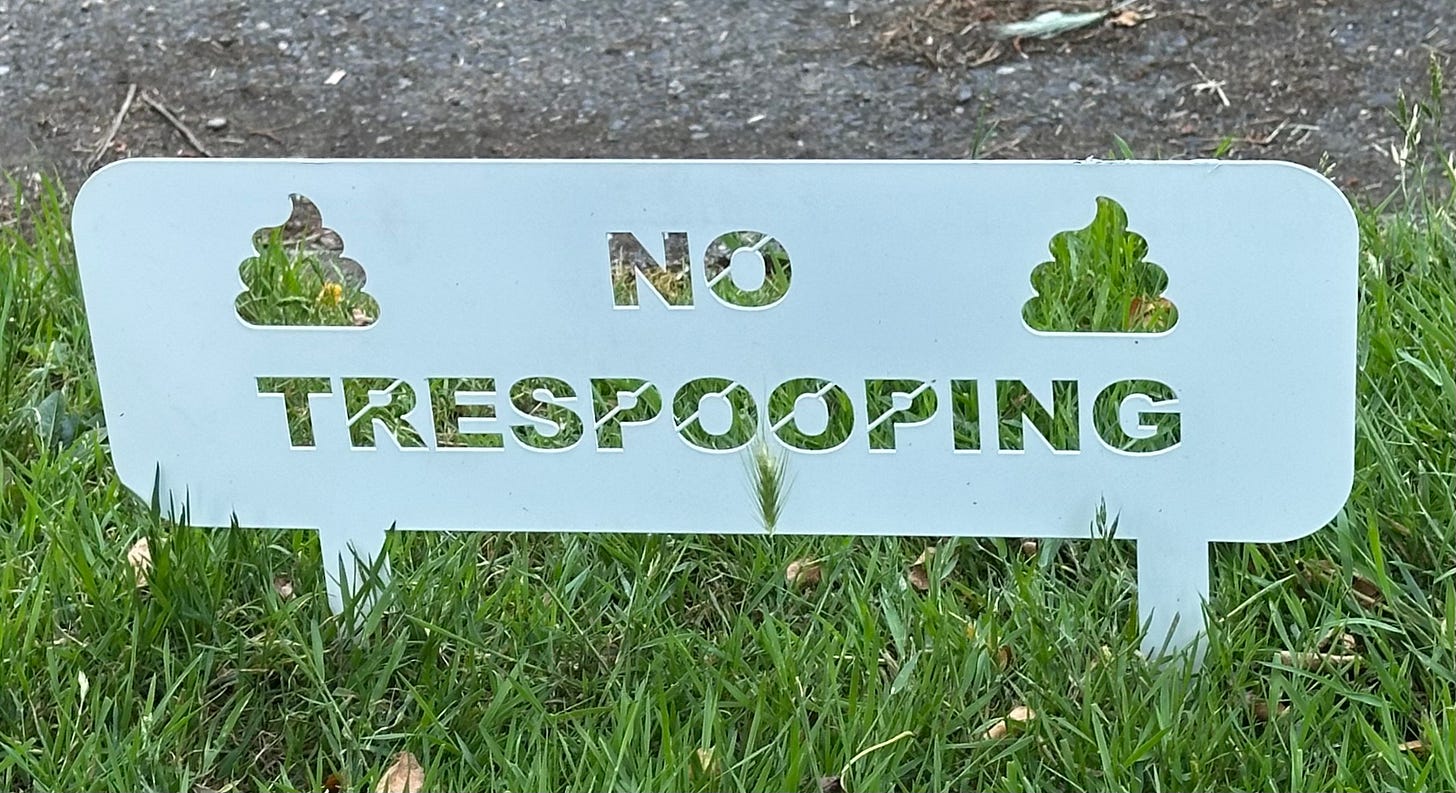Check in
Height of summer
This is the best part of the season. The temperatures are climbing but not hot yet, at least not in Portland. Last week, some cleansing rain washed the nascent dust off the leaves of shrubs and trees. Roses are readying their second blooms and the air is fresh and clear.
Later, the season will sag as heat, dust and drought (in Portland, the summers are dry) make plants pant for relief. Parking strips and lawns will turn yellow. Neighbors will put out bowls of water for passing dogs. Here’s a doggie rest stop.
And on Southeast Lincoln, a tongue-in-cheek “dog library.” Take a stick, leave a stick.
Hag stones
If you go beach-combing this summer in Oregon, you may find a stone like this one that I found maybe 40 years ago.

These hole-y stones are known as hag stones, adder stones, witch stones and serpent’s egg. I can stick my fingers through the holes, which go all the way through.
I thought the holes were created by water erosion, but no, they are formed when little clams burrow into soft stone. The clams are pholads, also known as angel wings or piddocks. You can’t eat these clams, as they are too hard to get out of the burrows—and too full of sand if you do pry them free.
Time triad
Three words:
Second
Minute
Hour
I expected that this triad would be straightforward, but boy, are there a lot of ways you can use these words, especially “second.” Each of these words about time has some surprising secondary meanings.
Second
What’s the first thing you think of when you hear the word “second”? I think of the unit of time. Then of the rank after “first.”
I’m indebted to the dictionary for reminding me that a “second” is an inferior piece of goods, that “seconds” are the next serving, that a motion can have a “second.”
As a verb, you may “second” a motion. Or “second” your buddy who’s dumb enough to duel.
“Second” seems like a sorry word, never at the front of the line. Yet it may also have the meaning of one among equals, as when “second” is one of the gears of a vehicle. Or when something comes in a timely manner, like every second month. A second language can be equivalent to the first. As for the phrase “second nature”: is there a first nature?
Minute
Give me a minute to arrange my thoughts. While I was dressing today, I kept noticing how long a minute was. I can put on all my clothes in one minute. Get one foot into a brace and tie the shoe in one minute. Starting today, I’m going to notice minutes more.
MiNUTE, with the accent on the second syllable, means tiny. A minute isn’t as minute as a second, but that’s English for you. Add that to your committee’s minutes, the next time you write them.
There are 60 seconds in a minute and 60 minutes in a degree, and these facts are used for geographical coordinates.
Hour
I’m going to cheat a bit here. For lack of true secondary meanings, I’ve come up with a second word, “our,” that is pronounced the same but has nothing meaningfully in common with “hour.”
An hour, the measure of time, can be a long time. Or way less time than you need. Time is fungible, see. It expands and contracts around us. I’m determined to notice hours more, too.
“Our” is a homophone of hour. My purpose in including this is plain silly. Hour and our: measure of time and something that is of us.
We set the hour on our alarm clock.
Brentwood Darlington
Last weekend, I went to an artisan market at the Brentwood Darlington Community Center. About 30 vendors presented an amazing range of items from unusual jewelry to crocheted chickens to tarot readings. Many designs were innovative, like Pink Snake Studios’ pouches and tote bags made from the plastic banners that once decorated mall stores.
Brentwood Darlington is the relatively new name of the neighborhood formerly known as Errol Heights. It’s in the far southeast corner of Portland and has traditionally had some of the city’s least expensive housing. In 1986, the year of the name change, the neighborhood was finally annexed to Portland.
Back in the day, Errol Heights and neighboring Lents were sometimes jokingly referred to as “felony flats.” I doubt that the residents found this funny, though. Still, there’s a neighborhood bar with the playful name Misdemeanor Meadows.
Gentrification is bringing rising housing prices and housing scarcity to all neighborhoods of the city, including Brentwood Darlington. The median home price in 2024 was $415,000, according to Portland Monthly. I remember in the 1970s housing like this could be had for less than $20,000.
Small houses that once showed signs of aging and blight are being revived with fresh paint and plantings. Residents, many of them longterm, are fiercely proud of their corner of Portland.

Practice
What is your practice? That’s a question about the noun. How do you practice? That’s a question about the verb. Both are important.
Practice, the verb, may be your writing discipline. Or it could be playing a musical instrument. Or perfecting a recipe. Or raising a child.
Piano vs violin
Growing up, I could never choose whether to focus more on the piano or the violin. My violin teachers were very strict, trained in pedagogy. Practice started with scales and etudes.
My piano teachers, though, tended to be kindly suburban housewives looking for a little butter money. Rather than having a plan for improving my technique, they would just give me a piece to practice. I remember sheet music for a song called “Ebb Tide.” Some sort of squishy popular number. I was a snobby kid. I wanted classical, but didn’t know how to protest. I played “Ebb Tide,” but I can’t remember the tune.
Eventually I left the moms behind and just “practiced” piano on my own. I played pieces I liked from compendiums of classical tunes or the red John Thompson books or the hymnal. I got very, very good at sight-reading, but without scales and etudes, my playing suffered. I never got to be very fluid. Rather than knuckling down and learning a piece, I’d flit on to the next one.
I don’t know much theory—how, for example, keys and chords fight with and complement one another. My children were blessed with a wonderful piano teacher, Betty Balmer, who taught theory as well as good piano practices.
Today’s practice
Now in late adulthood, I play easy pieces on my violin, Irish and bluegrass fiddle tunes mostly. I used to play in community orchestras, but with the MS, it’s difficult to get to my chair with the other violins, and I can’t sit for hours to rehearse and perform.
Practice does make perfect. But even with the scales and etudes, I did not practice consistently enough. I learned to love the violin on my terms, playing easy tunes, not concertos. I trained my ear so I usually play in tune.
In orchestra, by the way, I was always a second violin. In community orchestras, I chose that section, a holdover from high school orchestras, where at least I was first-stand second violin.
Now, you
What is your practice? Do you play an instrument? Do you still play now that you are grown up?
How do you practice another skill? Running or writing, cooking or riding an electric unicycle? I hope you are skilled and proud of your accomplishments—and that you take time to practice.
One kind of practice
One practice I follow is writing every day. I start each day with 20 minutes of free writing. I’ve done it for decades and it works!
Here is another a way to approach that practice. It’s just a suggestion. You do what works for you.
Set aside seven minutes (or thereabouts) to set your focus
Breath into your goal
Focus
Breathe
Repeat
Then, work on what you want. Work toward what you need.
Do these things every day, writing for two, three hours a day. Any more than that and focus starts to fail.
Every day:
Breathe
Exhale
Meditate
Write
Write
Write some more
Some other everyday activities:
Go outside. Draw the cloak of the natural world around you.
Read wisdom literature, great novels, poetry.
Connect with others, with nature, with yourself.
Cook, eat something real and nourishing.
For me an overarching practice, one that makes the other practices work, is Bus Therapy. I straighten out my psyche just by boarding the bus, being part of the scene, and watching the passengers, the streets, the buildings, the trees, the clouds. As I travel, I move out of myself and get back into myself.
Two more things:
Go to bed the same time every night.
Take the seventh day off.
Round
A cup, a wheel, a penny. Ends meet ends. Infinity. Round things, like wheels, propel us, but still— Stand a coin on its edge, knock it over, An easy triumph. Sometimes my mind loops around, Tagging back to old trauma, The hurts never recovered. Snip the loop, stop the tape, unwind it. Keep on going without the replay. When bad memories come to my door, I slam it shut— And go back to my life.
Check out
A meme
This delicious thought is not original to me. I saw it somewhere on the Internet:
I have decided to stop being self-aware. What I do is none of my business.
Joint
I saw a business on Southeast 11th called The Joint. I wonder what kind of business that could be:
Barbecue place or butcher shop
Cannabis emporium
Dive bar
Carpenter
The answer . . . It’s a chiropractor.
Punny businesses
Annie Haul, a garbage clearing operation, is owned by Kate O’Halloran. It’s been around for 20 years, but this week was the first time I saw a truck. I was rushing to catch a bus, so I didn’t stop to take a photo. I just love the name, and looking them up, I find that Annie Haul’s owners are environmentally sensitive and make an effort to recycle what they’re called to haul away. Plus the cute Woody Allen reference.
At the Gresham farmers market I encountered FantaSea, a business where retirees Henry and Lorraine craft items, including magnets, from seashells.
Lots of business use puns in their names. A local one is Human Bean, drive-in coffee.
Three little poems
Poems don’t alway come easily. Only short ones this week.
Trite writing
Been there, done that. Try again tomorrow. When words sink to clichés, time to go home. Crawl into your burrow and suck on your toes, Wait for the sunrise and try it again.
Discovery
Buckets of sand, pails full of pebbles Baskets of shells, carry them all Away from the seashore. Maybe you’ll find A Japanese float amid the seaweed.
Why worry?
Worry for nothing, the pathway stays clear The dog doesn’t bite, the clock is your friend. You had sniffles, no cold, so stop fretting, my friend, Lace up your books and keep on going.
That’s it, folks
Issue #151 of Becoming is live. If you like it, poke the heart icon. If you love it—or you think of another punny business name—leave a comment.
I have a “chat” for Becoming, one of the arcane features of Substack that clutter up the experience. Once in a while I remember to check if anyone has been lurking there, leaving comments or looking to start a conversation. If you initiate something there, instead of in a comment, I will try to respond.
Thank you for subscribing! I love it when free subscribers decide to reward my efforts by upgrading to paid, but I value both.
If you would like to tip me five or ten bucks, or maybe $1,000, here’s the PayPal link.
Till next week,
Fran







Small world again. I met Kate O’Halloran in 2022 when I getting bids to clean out my mother’s house in SW Portland after she had sold it and moved into Rose Schnitzer. Kate was very nice. Like you, love the name of her company!
That was quite a hodge-podge today. I liked the rock. Is there a certain place where they congregate? Being "soft" enough for a clam to burrow into must mean they are volcanic. I guess.
As for practicing, I've already written about my childhood piano experiences and the torture involved. I included a poem called Burning the Piano in the Driveway. John Thompson books were torture and I asked my teacher, since I was an adolescent at the time and listening to R and R, if there was a book of that I could use. She found a book of boogie-woogie pieces that were a blast to play. Sadly that book is lost in time, but three years ago, I started the Alfred Adult Piano courses and am in the middle of the second book. He includes old standards, classical, hymns, whatever teaches a certain skill. It's been a fun and often frustrating adventure. I've memorized seventeen pieces, but if I don't play them at least once a week, they deteriorate. This is more an exercise in keeping my memory tuned as well as being able to learn new things at 75.